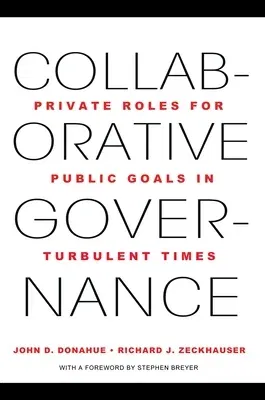How government can forge dynamic public-private partnerships
All too often government lacks the skill, the will, and the wallet to
meet its missions. Schools fall short of the mark while roads and
bridges fall into disrepair. Health care costs too much and delivers too
little. Budgets bleed red ink as the cost of services citizens want
outstrips the taxes they are willing to pay. Collaborative Governance
is the first book to offer solutions by demonstrating how government at
every level can engage the private sector to overcome seemingly
insurmountable problems and achieve public goals more effectively.
John Donahue and Richard Zeckhauser show how the public sector can
harness private expertise to bolster productivity, capture information,
and augment resources. The authors explain how private engagement in
public missions--rightly structured and skillfully managed--is not so
much an alternative to government as the way smart government ought to
operate. The key is to carefully and strategically grant discretion to
private entities, whether for-profit or nonprofit, in ways that
simultaneously motivate and empower them to create public value. Drawing
on a host of real-world examples-including charter schools, job
training, and the resurrection of New York's Central Park--they show
how, when, and why collaboration works, and also under what
circumstances it doesn't.
Collaborative Governance reveals how the collaborative approach can be
used to tap the resourcefulness and entrepreneurship of the private
sector, and improvise fresh, flexible solutions to today's most pressing
public challenges.

